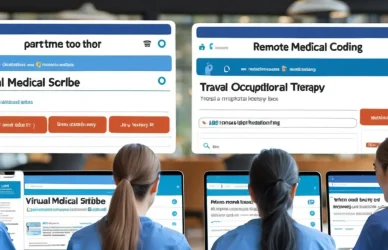Physician burnout is no longer just a buzzword — it’s a growing epidemic in the healthcare industry. While emotional exhaustion and long work hours are widely known culprits, there’s another factor that often flies under the radar: economic pressure.
From reimbursement cuts to rising administrative demands, financial stress is reshaping the landscape of healthcare careers.
Understanding Physician Burnout
Burnout isn’t just being tired. It’s a chronic condition caused by prolonged stress and dissatisfaction, showing up as:
- Emotional Exhaustion – Feeling drained after each workday.
- Depersonalization – Becoming detached from patients or peers.
- Reduced Personal Accomplishment – Feeling like your efforts don’t matter.
These symptoms can hit any healthcare professional — from physicians to nurse practitioners and medical assistants — especially when job demands outweigh resources.
Economic Pressure in Modern Healthcare
Healthcare professionals are expected to do more with less. That’s where economic pressure creeps in:
- Insurance Company Constraints: Denials, delayed payments, and reimbursement issues.
- Increased Paperwork: Documentation, coding, billing — these tasks steal time from patient care.
- Productivity Quotas: Many doctors are pushed to see more patients in less time, sacrificing quality for quantity.
Even hospitalist jobs and physician assistant roles aren’t exempt from this squeeze, making financial stress a core burnout driver.
How Financial Stress Triggers Burnout
When healthcare workers are underpaid or undervalued, burnout becomes inevitable. Key triggers include:
- Workload Creep: Seeing 30+ patients a day just to meet RVU (Relative Value Unit) targets.
- No Time for Recovery: The push for efficiency often comes at the cost of breaks, downtime, or family time.
Impact on Job Satisfaction Across Medical Roles
Burnout doesn’t discriminate. It affects:
- Doctors – Decision fatigue and malpractice stress.
- Physician Assistants (PAs) – High patient loads with limited autonomy.
- Nurse Practitioners (NPs) – Balancing clinical care with endless paperwork.
- Medical Assistants & RNs – Working multiple shifts with minimal recognition.
Career Growth in the Medical Field
The burnout issue can also push professionals to grow or pivot. Some long-term paths include:
- Becoming a Medical Director
- Advancing to Chief Medical Officer
- Moving into healthcare IT jobs
- Specializing in education or policy
Whether you’re looking at jobs for registered nurses or career medical officer jobs, growth opportunities still abound — if you know where to look.
Inside the Hospital: Jobs That Keep Healthcare Running
Hospitals operate like cities — with roles beyond doctors and nurses:
- Medical Staff Coordinators
- Administrative Assistants
- Inpatient Coders
- Lab Technicians
Good Samaritan Hospital jobs and Memorial Hospital career openings are examples of institutions offering diverse roles beyond traditional bedside care.
Addressing Burnout with Better Work-Life Balance
Hospitals are starting to fight back against burnout with:
- Flexible scheduling
- Mental health counseling
- Protected PTO
- Part-time transitions
If you’re eyeing hospital part time jobs, this might be a smart move for your mental and physical well-being.
Healthcare IT and Admin Roles as Alternatives
Burned out? You don’t have to leave healthcare — just shift roles.
- IT positions in healthcare allow you to remain impactful without clinical stress.
- Project management, EHR training, and system support are high-demand areas that still offer purpose.
Explore postings like HCA job listings, healthcare IT jobs, or admin roles at university hospitals for a smoother transition.
Reducing Burnout: What Employers Can Do
To keep their workforce healthy and motivated, employers must:
- Offer fair compensation
- Cut unnecessary admin load
- Provide flexible and remote options
- Recognize employee contributions
Invest in mental health services
Tips for Healthcare Professionals Seeking Change
If you’re considering a change due to burnout:
- Audit Your Stressors – Time, workload, compensation?
- Explore Flexible Roles – Remote, part-time, or administrative.
- Search Strategically – Use targeted phrases like “healthcare jobs near me” or “work from home medical.”
- Network and Upskill – Join healthcare communities or earn a certificate online.
- Prioritize You – Your health is just as important as your patients’.
Conclusion: Redefining Success in Medicine
Healthcare heroes deserve to thrive — not just survive. The constant pressure to perform under tightening budgets can push even the most dedicated professionals to the edge. But the path forward lies in systemic reform, balanced opportunities, and a shift in cultural expectations around productivity and wellness.
Whether you’re looking for healthcare positions, considering work from home medical jobs, or aiming for leadership roles, know this: you can care for others without sacrificing yourself.






